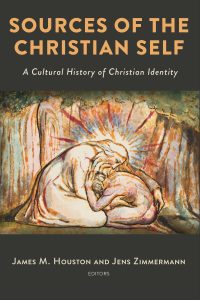Sources of the Christian Self: A Cultural History of Christian Identity (J.M. Houston and J. Zimmerman, 2018)

A history of Christian faithfulness
The calling of God to his people to be faithful never changes, but the specific shape of faithfulness changes because God’s people live in different settings that raise unique challenges. It should therefore be possible—and instructive—to identify exemplary believers throughout history to learn how they applied the call to faithfulness to their particular moment in history. This is exactly what 42 scholars do in Sources of the Christian Self, a new book edited by James Houston (Regent College) and Jens Zimmermann (Trinity Western University).
What did it mean to identify oneself as a Christian in different times and places? This is the question posed by this book. The basic calling of a Christian is to identify with “the name” wholly and simply, in a way that one’s confession of Christ becomes the most essential fact of one’s life. But this calling upon every generation of believers takes place under cultural conditions and, indeed, under changing cultural conditions. [p. xvi]
Sources of the Christian Self is divided into seven sections, with essays on individuals (or groups) from each period: Old Testament, New Testament, Early Church, Middle Ages, Age of Reform, Modern World, and 20th Century. I enjoyed being able to read through the chapters in order to catch something of the flow of history, or to open the book at random and find a discreet chapter on some person (or group) that can be read on its own. And the 42 whose stories are told is fascinatingly diverse including: Abraham and Jeremiah, James and Jude, Ambrose and Timothy of Baghdad, Aquinas and Julian of Norwich, Thomas More and Teresa of Avila, Charles Wesley and Christina Rossetti, C. S. Lewis and Flannery O’Connor. It is wonderful to meet old friends and also to make new ones—like Timothy of Baghdad, Thomas Becon, and a variety of African Christians. Every person who is covered has clay feet, flawed yet eager to know and live out “what it means to be a Christian and therefore a fully human being” [p. xxv].
Perhaps the best way to introduce Sources of the Christian Self is to provide a quote, this one from the chapter on Jacques Ellul:
The Christian, Ellul contended, echoing Jesus’s high priestly prayer in John 17 is to be “in” this world but not “of” it. By implication, he stressed that Christians needed to make a concerted effort to understand their social and cultural circumstances for the sake of trying to discern where, within these circumstances, the possibilities of genuinely redemptive individual and social action actually lie. “We must seek the deepest possible sociological understanding of the world we live in,” Ellul contended in The Presence of the Kingdom (1967), “in order to find out, as precisely as may be, where we are and what we are doing, and also what lines of action are open to us.” Insofar as such lines of action are concerned, Ellul believed that Christians are called to be present—which is to say, to bear witness to the possibilities of grace and freedom—at precisely those points of maximum tension between a sinful world at enmity with God—a world that is, in effect, bent on suicide—and God’s redemptive purposes for the world. “Our concern,” he stressed, “should be to place ourselves at the very point where this suicidal desire is most active, in the actual form it adopts, and to see how God’s will of preservation can act in this given situation.” [p. 649]
Please do not imagine that Ellul’s challenge applies only to scholars and leaders on the cutting edge of society. The “points of maximum tension [in] a sinful world at enmity with God” are as suicidal and as real in ordinary lives and events as they are in the more rarified worlds of academia, commerce, art and politics.
Sources of the Christian Self is serious, not light reading. The intended audience is intelligent Christians willing to take the time to grow theologically by reflecting on historical studies on Christian identity over time in a changing and broken world. Or as Houston and Zimmermann put it, “theologically interested, broadly educated readers with interdisciplinary affinities, eager to understand their own Christian tradition and to engage the wider intellectual and often secular world” [p. xxiii].

